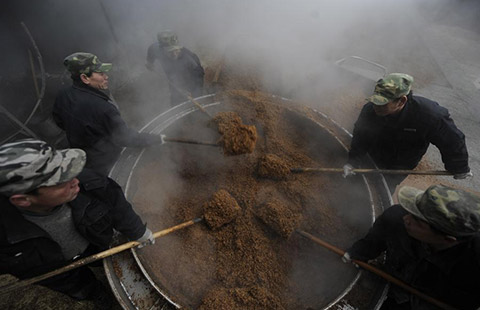China's real estate market reacts to new measures
BEIJING -- China's real estate market has actively responded to a series of measures aimed at controlling housing prices issued by the State Council, China's cabinet, on Friday.
Daily inquiries and demand for housing purchases on Saturday, just one day after the new policy came out, rose by 30 percent from Friday, according to Hu Jinghui, vice president of 5i5j Real Estate, a leading real estate agency in Beijing.
Hu forecast that the trading volume of second-hand housing would hit a new high before detailed rules on the real estate market are implemented by local governments and government departments.
According to the statement from the State Council, homeowners selling property will have to pay a capital gains tax of 20 percent of the profit they make on the transaction.
Homeowners were previously taxed 1 percent to 2 percent of the total sale price.
The tax levied on a second-hand home sold for 2 million yuan ($320,000) jumps from around 20,000 yuan to 200,000 yuan under the new rule.
Other measures include higher interest rates and minimum down payments for those buying a second home in cities with high real estate prices.
Dong Chao, a citizen in Huzhou city, Zhejiang province, had planned to sell his current home and move to a larger one. But the new policy has prompted him to reconsider.
"The new policy is unreasonable for people who want to buy a second house to improve their living conditions, because [such purchases] do not contribute to speculative and investment-driven housing demand," said Dong.
There have been concerns that the high taxes may result in another round of price hikes, as the new tax burden could easily be transferred from homeowners to home buyers.
Housing transaction centers in big cities like Beijing, Shanghai, Guangzhou and Nanjing were packed with hundreds of people waiting to make their housing purchases official and legal on Monday and Tuesday.
"The new policy is a heavy blow to the overheated second-hand housing market, especially in large cites," said Zhang Dawei, a senior researcher with Centaline Property.
Many people, both buyers and sellers, are rushing to "catch the last bus" and complete their deals before the new measures are fully implemented, Zhang added.
Some researchers said the new rules will push up prices of new homes at a faster pace, while some analysts hold that demand for existing homes will not necessarily shift to new homes.
Hou Chunyan, a real estate researcher with Dacheng Fund, said the development of the second-hand and new housing markets have always overlapped in the past.
Those looking to improve their living conditions usually buy a new home after selling their current one. Also, second-hand homes are often near resources such as schools, commercial centers, transportation infrastructure and other facilities that new homes might lack in the short term, said Hou.

















